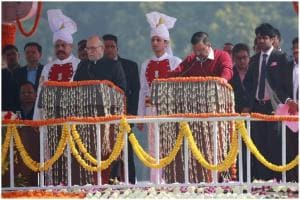"Jamia 2019 Assignment ki writing adhoori,
kal submit kar di poori,
toh library chaldi taki jaldi
khatam karke ghar nikali"
"...But likhna jaise shuru kara bahar shor,
Many students ran inside in panic and locked the door.
"..Do minute mein police ne gusse se darwaza toda,
thank god they're here, now they will get us out.
Par mere samne hi lathi se mere dost ka sar jo phoda".***
The words belong to a song that was released weeks after violent clashes between Delhi police and anti-CAA protesters in Jamia Millia Islamia in December that left several students injured. Nearly two months since, videos of police attacking unarmed students in the library have started to cause outrage. And one of the most vocal critiques of the government and police seems to have come from the musicians of the country who have started to explore protest poetry to peacefully register protest against injustice.
"We are protest posts we don't fear no gun"
The art of protest poetry is as old as the art of protest itself and in 2020, both protest, and protest poetry have captured the national imagination.
Be it the feisty words of revolutionary, anti-establishment Urdu poets like Faiz Ahmed Faiz or the throbbing verses of young musicians across genres, protest poetry has come to aptly capture the mood of the nation, deep in debates regarding a variety of government impositions. And a particular genre that has been pulsating with new content is the underground rap scene.
"We have finally come to a place where protest rap is becoming mainstream and doing what it was actually meant to do - create discussion and debate about injustice and inequality," says rapper Santhanam Srinivasan Iyer, better known as 'EPR'. The acronym stands for 'Emcee, Poet, Rapper'.
A 30-year-old rapper from Kolkata, EPR started writing and rapping his own songs as a teenager. After co-founding the award-winning alternative rock/rap band Underground Authority in 2010 and performing as its lead vocalist, the rapper has now started to develop his own brand of music which is more heavily focused on using art as a medium of dissent.
"I hope awaz hamari wakes up the nation"
In wake of continued protests against the Citizenship (Amendment) Act 2019,(CAA) as well as proposed nation-wide National Citizenship Register (NRC) and National Population Register (NPR), the rapper has come up with a new song that has already become a hit on social media.
Called "We Inna Hindustan" and written in collaboration with Delhi-based rapper Void, the song talks about the alleged atrocities mounted by police across India on pro-democracy protesters. The song followed several incidents of violence in which protesters in Delhi's Jamia Millia Islamia as well as in Uttar Pradesh's Aligarh Muslim University and other parts were attacked by armed policemen. It also came in the wake of several incidents of shootings in protest sites in Delhi including outside Jamia that injured a student.
Incidentally, the suspension of comedian Kunal Kamra's flying rights following an incident of alleged 'heckling' of Republic TV journalist Arnab Goswami also made it to the song. According to the rapper, the problem with the government was that it refused to acknowledge any questions. "It becomes the responsibility of artists who have a voice to become the voice for those who the large masses who don't."
The rapper, who was born to a conservative Brahmin family in Tamil Nadu, says he had to fight it out with his parents when he started rapping. "They would not understand what I'm writing about, they even disowned me," EPR recalls. But since then, he has tried to leave behind the identity of "Santhanam Srinivasan Iyer" to craft a new identity for himself as EPR - one that does not reflect his class or caste but only his identity as a musician and a protest poet.
Though proud of his Southern heritage, being a musician is his only caste, creed and religion, he says. The musician does, however, acknowledge that though he had his own struggles, several other artists from discriminated castes still had very little opportunity to express their art and anger, thanks to the systemic oppression.
"But social media is an important medium, it is direct and reaches a wide variety of audiences within a matter of hours," the rapper muses, adding that he hopes the platform gives more space to such artists.
And in the past few years, it has. Rappers such as Sumeet Samos have for a few years now been rapping against the oppressive caste system in the country and the atrocities that members of the so-called "lower castes" continue to face at the hands of dominant upper-caste majorities across the country.
Others such as former Jawaharlal Nehru University student Rahul Rajkowa from Assam whose anti-CAB rap went viral in 2019. The artist previously sand against Assam NRC as well. Similar artists from Bengal have started to crop up as a reaction to the anti-CAA protests which turned violent in Bengal in several instances with the issue even dominating local state politics.
"We inna Bengal with our backs against the wall"
EPR, who calls himself a "reporter from the streets", fears that the new wave of sectarian politics has now been entering Bengal and may end up influencing voters. The past couple of years has seen an increasing rivalry between the ruling Trinamool Congress and Bharatiya Janata Party with several clashes turning violent. With state elections in Bengal coming up in 2021, the rapper feels creating protest art and poetry was all the more important. "Bengal always had its own culture of questioning. This is the land of Kazi Nazrul and Subhash Chandra Bose, revolution is in its blood," he says. "We cannot let fascist and oppressive narratives rule this state, or in fact any part of India".
Looking at the new crop of protest poets, EPR, who is deeply influenced by Bengal's local ethos, especially that of Kolkata where he grew up and spent formative parts of his life, feels that India is at the precipice of a music breakthrough which will be driven forth by hip-hop.
"Indians were served the wrong kind of commercial hip-hop when it came up in places like Punjab, it was more club and R&B, less hip-hop," he explains. He adds that it was only recently and thanks to shows like MTV Hustle and films like Gully Boy that a version of hip-hop closer to its original, fiery form was becoming mainstream.
"The idea of hip-hop is rooted in dissent and unity. It is through hip-hop and in fact any art that many in the country who feel disillusioned and helpless can find a way to contribute," EPR says.
All the musician's previous songs have each focused on a particular aspect of social disparity. His song "Akla Cholo Re" was about farmer suicides while another, 'Yeh Bata', was based on the severe problem of human trafficking in Bengal. EPR has also written songs about the Syrian refugee crisis as well as songs like "Ab Ki Baar Kaun" that were meant to educate the youth by showing them a hardened critique of India's electoral politics.
**("Jamia 2019, my assignment was incomplete,
submitted it yesterday.
So I walked to the library
to finish work and leave quickly for home"
"...But as soon as I started writing, I heard noise outside
Many students ran inside in panic and locked the door."
"A two minutes the police angrily broke the door,
We were relived, thought cops will save us,
But in front of me they broke my friend's skull with lathi).














